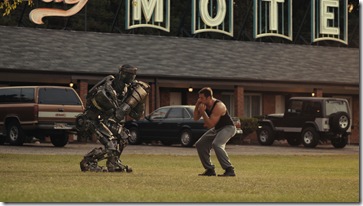What do you get when you mix elements of The Champ [either version], Rocky and Rock ‘Em Sock ‘Em Robots? Real Steel! Though that’s not as bad as it sounds…
We’ve seen all the parts of Real Steel before: washed coulda-been unsuccessful at even the low end of the business; the feisty trainer/gym owner who still has a soft spot for the big lunkhead; the spunky kid who has a quick wit and unexpected knowledge; The Big Fight. Real Steel succeeds because it takes the boxing movie clichés and works away all the unnecessary trappings to find the truth at their heart.
Charlie Stanton [Hugh Jackman] was once a contender, back when human boxing could still thrill a crowd. Now that human boxers have been replaced with towering pugilistic robots, he’s reduced to playing county fairs with a boxing robot that, like Charlie, has seen better days – pitting Ambush against a thousand pound bull for the amusement of families more intent on the rodeo and their corn dogs.
Poor Charlie even manages to lose there – he gets cocky, plays the crowd and forgets to keep his eye on the bull. Kind of like his actual career in the ring. When it comes time to pay the piper – in this case a good ole boy with a mean streak [Kevin Durand], Charlie flees because he doesn’t have the money.
Even Bailey Tallet [Evangeline Lilley] has pretty much given up on Charlie – though she does let him use her gym, and is still willing to help him with his fighters.
Learning that he has a son doesn’t really affect him much – except for way it can get him some badly needed cash. The boy’s aunt Debra [Hope Davis] wants custody but her husband [James Rebhorn] wants some kid-free time with her in Europe. For $50,000 up front, Charlie agrees to look after the kid for the summer – but Aunt Debra must never know.
Fortunately for Charlie, Max [Dakota Goyo, Thor] is as smart as he is spunky. After trying to brace Charlie for half of his cash infusion, he turns out to be very knowledgeable about robot boxing – which is good because Charlie proceeds to purchase a former top-ranked robot called Nasty Boy and lose his shirt [again] by getting cocky and not knowing what the robot can do.
All this leads to a bit of breaking and entering and the exploration of a junkyard in search of enough parts to cobble together a new fighter. An near tragic accident seems to be leading to some father/son bonding, but it’s a false alarm – though Max finds a sparring ‘bot that he cleans up and repairs.
Next, he wants Charlie to find Atom [the name is embossed on the little ‘bot’s chest] a fight – and an improbable rise, against all odds, begins.
Naturally enough, Bailey and Max hit it off – which bugs Charlie. By this point, we know that the kid is going to wear him down, but the process is made enjoyable because Goyo gives an impressively real performance. His max may be whip smart and know a lot about robot boxing, but he’s also a lost boy looking for a family. He hides his insecurity behind bravado, like Charlie, but, unlike Charlie, he actually has the ability to succeed – if anyone will just take him [and Atom] seriously.
Director Shawn Levy is best known for his Night at the Museum movies and Date Night, so he knows where to find the humor in the story – and just how much to use it. Just as he did with Date Night, though, he finds the poignancy of his film’s main characters and, by the time Atom fights a behemoth called Zeus for the championship [see: The Big Fight], we’re solidly into the characters.
Real Steel works because the characters are drawn well enough to feel real and because the fights are brilliantly choreographed [Sugar Ray Leonard consulted on all the boxing sequences]. The balance between the emotional, human content and the brutal fighting sequences [Zeus dismantles his foes like an eight-foot tall, two ton Mike Tyson, for example] is just right.
It doesn’t hurt that Jackman, Lilley and Goyo all have tremendous chemistry – or that Goyo is [at least] as good as the young Jackie Cooper or Ricky Schroder [the kids in the two versions of The Champ], or that the final round of the title fight finds Atom, through Charlie, using a classic tactic that comes right out of Rocky.
John Gatis wrote the surprisingly light-on-hokum screenplay from a story by Dan Gilroy and Jeremy Leven – which, in turn, was inspired by a Richard Matheson short story that was the basis for an episode of the original Twilight Zone. The result is a movie that is a collection of stripped down clichés that knows the truth of its characters and allows them to be genuine and not caricatures.
The success of the Transformers franchise may have paved the way for Real Steel, but it’s its own thing – and a very entertaining movie. It’s a winner – not a knockout, but definitely on points
Final Grade: B+
Photos courtesy Walt Disney Studios/DreamWorks.

